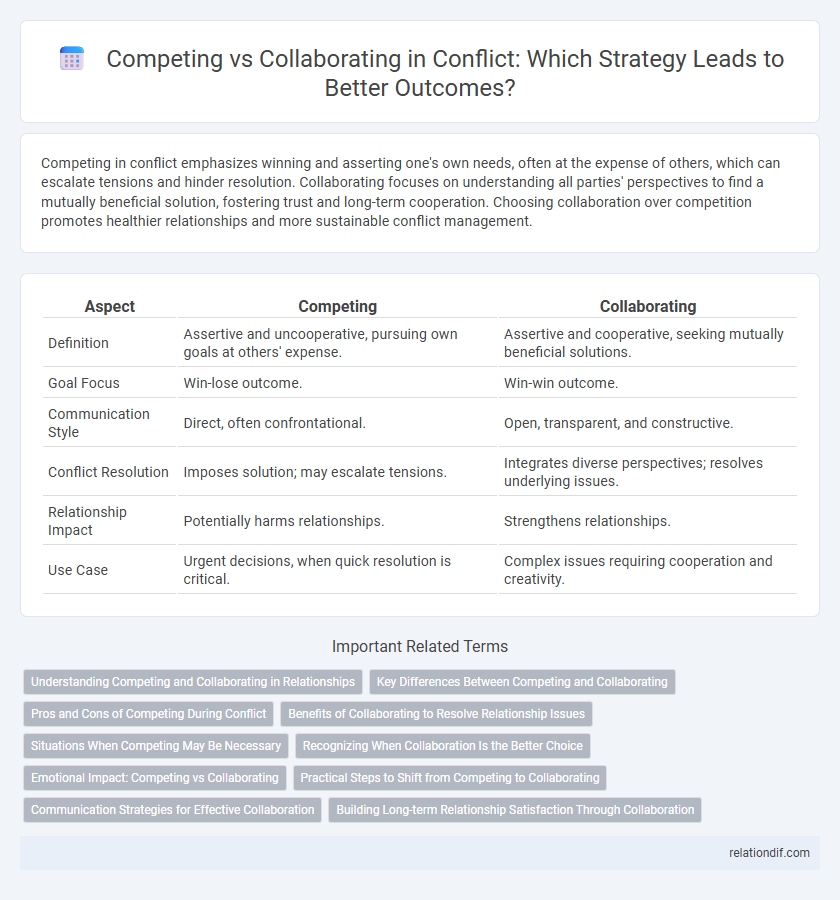Competing in conflict emphasizes winning and asserting one's own needs, often at the expense of others, which can escalate tensions and hinder resolution. Collaborating focuses on understanding all parties' perspectives to find a mutually beneficial solution, fostering trust and long-term cooperation. Choosing collaboration over competition promotes healthier relationships and more sustainable conflict management.
Table of Comparison
| Aspect | Competing | Collaborating |
|---|---|---|
| Definition | Assertive and uncooperative, pursuing own goals at others' expense. | Assertive and cooperative, seeking mutually beneficial solutions. |
| Goal Focus | Win-lose outcome. | Win-win outcome. |
| Communication Style | Direct, often confrontational. | Open, transparent, and constructive. |
| Conflict Resolution | Imposes solution; may escalate tensions. | Integrates diverse perspectives; resolves underlying issues. |
| Relationship Impact | Potentially harms relationships. | Strengthens relationships. |
| Use Case | Urgent decisions, when quick resolution is critical. | Complex issues requiring cooperation and creativity. |
Understanding Competing and Collaborating in Relationships
Competing in relationships often centers on asserting one's own needs and goals, sometimes at the expense of others, which can lead to tension and unresolved conflict. Collaborating involves open communication and mutual respect, aiming to find solutions that satisfy all parties and strengthen the relationship. Recognizing when to compete or collaborate depends on the context and desired outcomes, with collaboration generally fostering long-term trust and harmony.
Key Differences Between Competing and Collaborating
Competing involves prioritizing individual goals and winning over others, often leading to a zero-sum outcome where one party's gain is another's loss. Collaborating seeks mutual benefit by addressing all parties' concerns, fostering creative problem-solving and long-term relationships. The key difference lies in competing's adversarial nature versus collaborating's emphasis on cooperation and shared success.
Pros and Cons of Competing During Conflict
Competing during conflict allows for quick decision-making and clear assertion of one's position, which can be effective in urgent situations or when important principles are at stake. However, this approach often leads to increased tension, damaged relationships, and reduced cooperation, as it prioritizes winning over mutual understanding. Balancing assertiveness with empathy is crucial to avoid the pitfalls of a purely competitive stance in conflict resolution.
Benefits of Collaborating to Resolve Relationship Issues
Collaborating in conflict resolution promotes open communication, fostering trust and mutual understanding between parties. This approach encourages creative problem-solving, resulting in solutions that satisfy the interests of all involved. By prioritizing collaboration, relationships strengthen through shared commitment and reduced resentment, leading to long-term harmony.
Situations When Competing May Be Necessary
Competing becomes necessary in high-stakes negotiations where resources are limited and immediate decisions impact organizational survival. Situations involving market share battles or legal disputes often require assertive, competitive strategies to protect interests and achieve favorable outcomes. In scenarios where time is critical and collaboration risks delays, a competitive approach ensures swift resolution and decisive action.
Recognizing When Collaboration Is the Better Choice
Collaboration is the better choice in conflict when both parties share common goals and the outcome requires mutual benefit or long-term relationship maintenance. Recognizing situations where resources, knowledge, or expertise must be combined to achieve a superior solution emphasizes collaboration over competition. Prioritizing open communication and trust-building fosters a cooperative environment that leads to more sustainable and innovative resolutions.
Emotional Impact: Competing vs Collaborating
Competing in conflict often heightens emotional tension, leading to feelings of anger, frustration, and defensiveness due to the win-lose mindset. Collaborating fosters emotional safety by encouraging open communication, mutual respect, and understanding, which reduces stress and promotes positive emotional outcomes. Research shows that collaborative conflict resolution strengthens relationships by building trust and emotional resilience.
Practical Steps to Shift from Competing to Collaborating
Recognize shared goals by identifying common interests in conflict situations to foster alignment between parties. Establish open communication channels that encourage transparency and active listening, enabling mutual understanding and trust-building. Implement structured problem-solving techniques such as joint brainstorming sessions to create collaborative solutions instead of competing for dominance.
Communication Strategies for Effective Collaboration
Effective communication strategies for conflict resolution emphasize active listening, clear expression of ideas, and openness to diverse perspectives to foster collaboration. Using assertive yet respectful language helps balance competing interests and encourages mutual understanding. Establishing common goals and maintaining transparency enhances trust and promotes cooperative problem-solving.
Building Long-term Relationship Satisfaction Through Collaboration
Collaborating in conflict resolution fosters trust and mutual respect, essential for building long-term relationship satisfaction. By prioritizing open communication and joint problem-solving, parties create solutions that address underlying needs and promote lasting harmony. This approach not only resolves immediate issues but also strengthens the foundation for future cooperation and shared success.
Competing vs Collaborating Infographic

 relationdif.com
relationdif.com